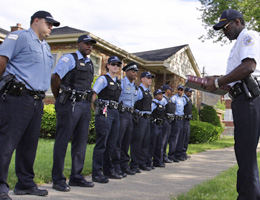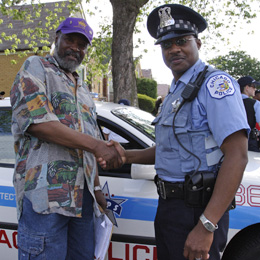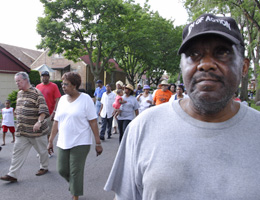Auburn Gresham sets up for summer safety
Nearly 80 people came together at a Common Ground Forum on May 18 to discuss safety and other issues in the Auburn Gresham community, and before the evening was over, they had agreed to stay organized and active through a series of summer events and meetings.

6th District patrol officers line up for inspection at an outdoor roll call at 85th and Hermitage.
Photo: Eric Young Smith
The Common Ground gathering included strong representation from block clubs, school principals, residents, Chicago Police, churches and community organizations. The meeting was convened by the Greater Auburn-Gresham Community Development Corporation (GADC) in partnership with 6th District Police Commander John Doty.
The moderator of the forum, GADC executive director Carlos Nelson, said the meeting would focus on two things: how to improve the quality of life in the neighborhood, and how to maintain safer streets. He urged people to “stand up, speak out and get involved.”

6th District Officer Thierry Constant greets a neighbor after the roll call.
Photo: Eric Young Smith
Cmdr. Doty said the meeting was a pilot effort within the police department to develop stronger communication with neighborhoods. “We know that collaboration goes a lot farther than individual commitment,” he said. And with the recent catastrophic incidents in nearby Englewood – the death of two young girls from stray bullets – it is appropriate for Auburn Gresham to be alert and ready.
“We are at the beginning of the summer season. There should be a sense of urgency to get things done,” he said.
Fr. Mike Pfleger of the Faith Community of Saint Sabina, which hosted the meeting in its school hall, acknowledged historic friction between the police and local residents – “some lack of trust on both sides” – but added that “it would be silly for us to be fighting, because the guys on the street will be laughing at us. We have to come together to prevent a crisis.”
Progress on many fronts
Updates from organizations and leaders showed that the groundwork for cooperation is already in place.
- Yvonne Plansky reported that the Problem Building Owners Initiative has worked with police to identify buildings with loitering, drug sales or tenant problems. “We ask the building owners to come to a meeting and we point out to them that they have a problem, and talk about what they are going to have to do to solve things.” She said the approach has spurred improvements in several buildings.
- Principal Clifton Hunt of Oglesby School noted that “we all know where the problems are, but we need to come up with action plans to solve the problems.” Three gangs are active around the school, he said, and the 6th District Police have been very helpful in locating a squad car at the school at key times. Also the school has reached out to parents and local businesses to get involved. “A parent can stand out in front of the school for an hour,” he said. “We have to let the gang-bangers know that we aren’t going to take it.”
- Yograman Arora of the Gas Station Owners Assn. also reported results when “community and police stand next to each other.” Problems with loitering and sales of individual cigarettes at his two gas stations and others in the neighborhood have been reduced. “If we have a problem,” he said, “they (6th District) send a squad car.”
- Shyvette Williams of the Neighborhood Action Forum said progress has been slow but steady over the two years that NAF has been meeting. The group identifies hot spots and then the 6th District holds afternoon roll calls in those areas, without prior notice, to disrupt gang or drug activity and to show neighbors that something is being done. Beat meetings are also an effective tool, she said, because they help identify problems at specific buildings or streets.
- The last report came from Fr. Pfleger, who told how a church-led action disrupted prostitution at the Cottage Inn hotel, which is now being demolished. The problem came to light in 2004 when a nearby Bank One branch instituted double security doors, enraging residents who felt the measure was demeaning. “The bank told us they were having trouble with people from the hotel, so we got a couple of busloads of people together and went over to the hotel one night and started knocking on doors, because there is no law against talking to people about Jesus,” Pfleger said. The hotel owner called police, whose presence further disrupted the night’s criminal activity. “Sometimes the community can do what the police can’t do,” said Pfleger.
Mixed groups ID action areas
Carlos Nelson then asked the group to engage in an exercise to identify more ways to improve the community. He had the crowd break into five smaller groups to 1) individually write down three to five ideas for improvement, and 2) discuss and prioritize among all ideas to come up with five main ideas from each group. These would be written on file cards and taped to the wall for discussion.

Willie Morrow of Men of Action (right) leads neighbors on the safety march.
Photo: Eric Young Smith
The groups soon were engaged in serious, heartfelt discussion: homeowners talking to cops, principals conveying their viewpoint to business people and activists, disparate groups finding common ground.
Patterns emerged: the need for male role models, parenting skills, crime enforcement, jobs, gang activity on local streets, landlord problems, block clubs, how retired people can help.
The groups reconvened and posted their five top issues on the wall – 25 ideas for creating a healthier neighborhood. Grouped into categories, here is what emerged:
- SAFETY (8 cards) – Greater police presence and cameras – More community participation in the schools – Improve police-community relations – More police on the street for higher visibility – Why can’t the police break up groups hanging on corners? – How can community members reach senior officers when 911 isn’t helpful and front desk is too busy? – Report drug dealers – Create adequate understanding that when you dial 911, immediate action needed!
- COMMUNITY (7 cards) – Organize men in the community to stand up! – Unite block clubs – Work and communicate together – Strong block clubs – Community involvement; report small issues and big ones – More male role models – Community meetings.
- PARENTING (6 cards) – A program for parent involvement – Improve parenting skills – Parents must do a better job raising their kids – Parent responsibility and participation – Parent involvement – How can parents do a better job enforcing curfew?
- EDUCATION (3 cards) – After school activities and jobs for teens – After school and summer youth programs – Mentoring programs for at-risk children.
- BUSINESS (3 cards) – Eliminate predatory lending in our communities – Examine and identify ways to increase employment opportunities – Promote and support local businesses to create jobs for youth.
Standing up for the community
The final session focused on how to begin moving forward, with an emphasis on short-term actions that can help maintain a safe environment this summer. Nelson asked participants if they felt they should continue to work in mixed groups or if it would be more effective to break up into functional constituencies (school leaders, police, block clubs). All agreed that cross-fertilization is more important, and that future work should try to maintain mixed groups to trade ideas and viewpoints.
Illinois Rep. Mary E. Flowers (31st) urged more participation by leaders at the Chicago Public Schools, parenting skill classes at the schools, and jobs-oriented programming including summer jobs for youth and construction-trades training. She urged connections to Kennedy King College and Moraine Valley’s trades programs.
Dr. Max Newsome, a dentist who has been on 79th Street for 39 years, asked how the community could give police the power to break up groups of youths that are threatening to his customers and neighbors.
Cmdr. Doty responded that there are constitutional reasons that police can’t do certain things, but that it can back up citizens when a specific problem is identified. “With your participation, there’s a different dynamic,” Doty said. “Good things can start happening when we walk out of this room and start to do something.”
Isadore Glover, Jr., a proud member of the St. Sabina congregation, told of a group called Men of Action, which is trying to connect with the men on the corners in a non-threatening way. “We have to stand up, go out to those corners and address the issues with these men.” He urged everyone to get involved with CAPS and to join the Men of Action in a planned march on May 30 (see photos), immediately following a 6th District Police roll call at 4 p.m. at 85th and Hermitage.
Future meetings and events
The meeting concluded with a series of announcements about future meetings and events (see Calendar). A followup meeting was later scheduled for 7 to 9 p.m. Monday, June 19 at St. Sabina’s, 7801 S. Throop.
Among the final words were these, from Cmdr. Doty: “Action, action, action, action! There has to be something that we are going to do . . . at Oglesby School or 79th Street or on your block . . . If you’ve got a problem on your block then let’s do something about it. We (the police) will stand with you.”

Neighbors marched on the blocks around 85th and Hermitage on June 30 to show their commitment to having a safe summer.
Photo: Eric Young Smith